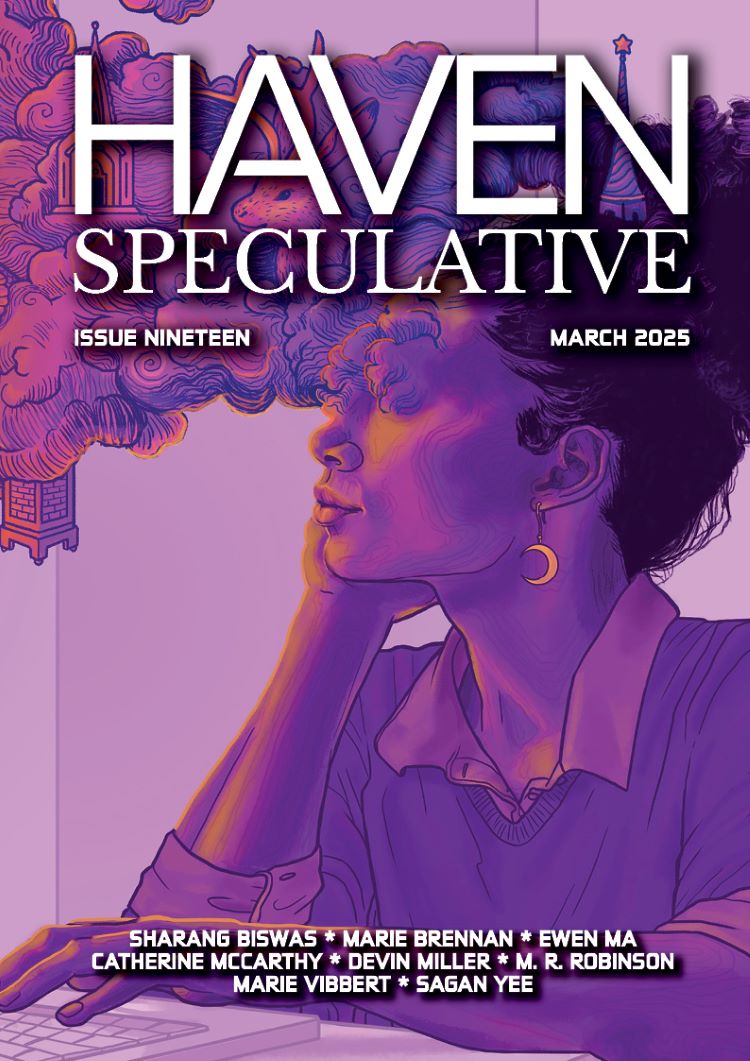FICTION
Ghost Apples
By Madi Haab in Issue Fifteen, May 2024
Cathilde pulled her foot back, shuddering at the sight. The rabbit was just outside the tent, laid out like an offering. Beady brown eyes stared up at a sky the colour and texture of meringue; its soft white fur rippled in the crisp wind, and a spray of red berries grew out of its mouth, covered in a thin lace of frost.
The first time it happened, Aglahé had sliced open the rabbit's—seemingly innocuous—belly to reveal a furl of pale flowers growing between its organs. The second time, a tangle of roots had grown overnight next to their tent, a white pheasant encased in its coils. The third, they had opened a handful of chestnut shells, only to find quail chicks nestled inside.
The One Who Listened
By N. R. M. Roshak in Issue Fifteen, May 2024
There is a language that I know, but my tongue cannot form the words. Even if it could, the sentences are too long for you to listen to. They stretch across hours, or days. You are like the small fast ones of the forest—the birds, the lightning sparks of minnows in the creeks—words pour off your tongue, your hands flutter in the air. I can move quickly, too, but language is meant to be slow.
You were trying to save me, I know. But it is very lonely here.
Through A Glass, Face To Face
By Rin Willis in Issue Fifteen, May 2024
The first time, I'm watching cat videos on my laptop when my chest starts to ache, and a long line of pain from my forehead down past my navel splits me into two.
And then, the sensation of fingernails, scratching under my skin.
When it's over, she stands naked in the moonlight, her body a mirror of my own. Same slightly upturned nose, same mouse-brown hair, same curves. But her eyes are filled with different histories, and her mouth is twisted in a smile that I have never been able to accomplish. In her right hand is a knife the color of old bone.
Ten Ways of Looking at Snow, Reflected Off an Obsidian Armor
By Avra Margariti in Issue Fifteen, May 2024
1.
You were cruel when we first met.
It would have been easy to claim I was sleepwalking, under your compulsion. But the truth was, I sought you out that midwinter night, in my spiderweb-flimsy nightgown and bruised, bare feet, chasing after a woodland vista I was taught through catechisms and beatings always to avoid. I left my bed in the smallest of hours despite parents and priests cautioning I stay away from the Erl-Queen's territory.
You were cruel, but you were honest too, unlike the honey-concealed callousness of my family and villagefolk. Wrapped in obsidian armor, you inspected me through the tenebrous gaps of your visor and said in a crushed-velvet voice, "My horse will cross this part of the woods once, and only once. It matters not to me if you join me or not."
Every Breath a Kiss
By Natalia Theodoridou in Issue Fifteen, May 2024
He thought drowning would feel blissful. Scary at first, the panic of breathlessness, but then pleasant and mostly serene. He had already decided that, when the time came, he would be eclipsed from this life with a mangled Manfred quote: "It is not so difficult to die, after all."
It was not peaceful.
The salt stung the inside of his torso, his ribs turned to knives that sliced him open. His very blood felt like an attack: an enemy of his own making. He swallowed mouthful after mouthful of seawater. His throat burned, his stomach distended to bursting. The sound of the ocean filled his ears: a beast, roaring with aquatic laughter. Manfred? Who's Manfred?
A Future in Ashes
By Matt Tighe in Issue Fifteen, May 2024
Cass can't bring herself to watch her brother burn. All the websites say you should, and that you should also watch as they scrape the ash up and put it in the urn. That you should not take your eyes off your loved one at all.
She doesn't understand how anyone could follow that advice.
She stays in the waiting area, sitting in one of the hard plastic chairs. There is a bereavement room with a couch and a small table where people can sit and weep in something closer to comfort, but to Cass it feels too small and... full. Full of sadness and confusion and the ache of stale loneliness. Her grief needs more space. Her grief is bigger than a small room already crowded with painful echoes.
Radio Petrichor
By E.M. Linden in Issue Fourteen, March 2024
It starts as superstition, like touching wood when she hears the word accident or never slicing into an orange. Then she tests it. Eight Saturdays in a row she drives to Hoban Point, crying her eyes out while the radio pours forth blue.
Years of drought. And then rain, every time.
It isn’t a coincidence. Noemi’s car radio controls the weather.
A City Undying
By Ai Jiang in Issue Fourteen, March 2024
“I know you said you don’t like kids.” Lingwei doesn't look at me as she brings her half-smoked cigarette up to her lips, leaning against the half-broken fence I sit on top of. “But Aisha needs a sitter. Just for today. And I can't do it.”
Her hand wanders to her back pocket, feeling for her cig packet. She takes it out, shakes it—there can't be more than a handful remaining—and shoves it back in with a sigh. I can almost hear her lungs deteriorating in real time.
Inaccurate Necromancy, A Tapestry
By Crystal Lynn Hilbert in Issue Fourteen, March 2024
[Exhibit 1: Scientific betrayal, witnessed in an illegally inhabited shipping container.]
My stolen satellite reception sputters, but not enough to hide the truth. I would know her face behind the fluttering colors of an ineptly stolen signal; I would know it dirt streaked in the dark over any hundred pilfered graves.
Drought Mermaids
By Lucero Valdovinos in Issue Fourteen, March 2024
The soil is parched beneath her feet. The word ‘drought’ hangs in the bare trees and weaves silently through the dead grass. It follows her, close and curious about the life and magic in her. Water, the landscape seems to murmur. Water. Water.
But there is none. Hasn’t been for years.




